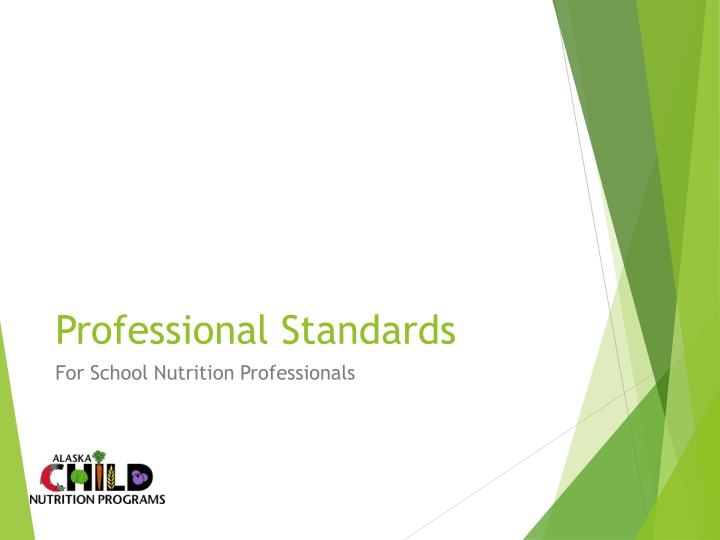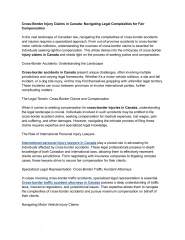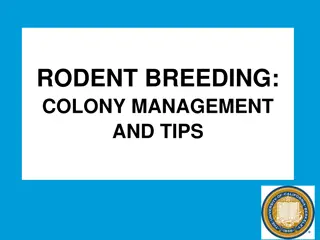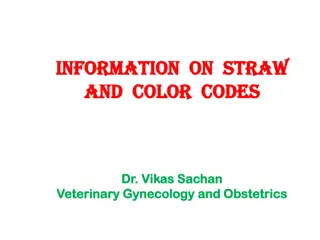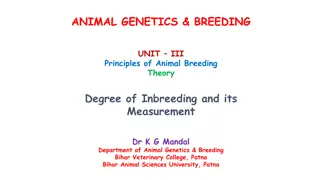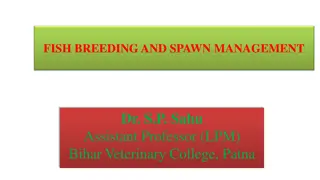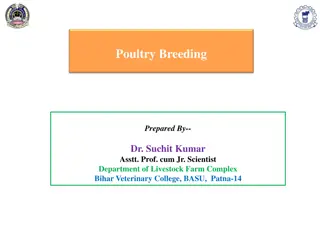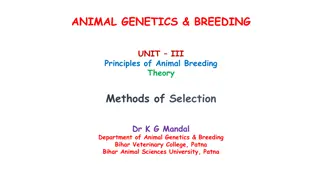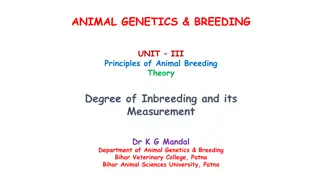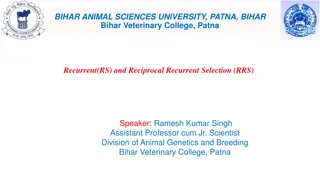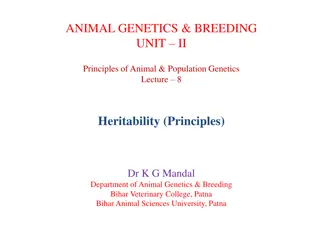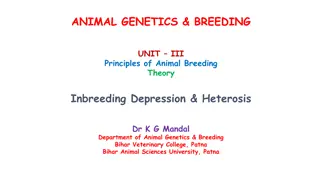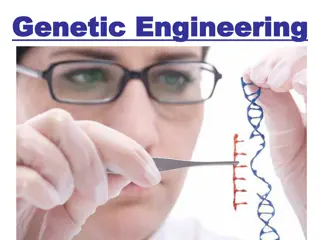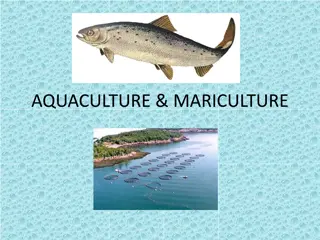Inbreeding and Cross Breeding in Sustainability
Exploring the impact of inbreeding in artificial selection, the benefits and drawbacks of inbreeding, and the importance of cross-breeding in maintaining genetic diversity. Learn about inbreeding depression, loss of heterozygosity, and the dynamics of genetic variation in populations.
Download Presentation

Please find below an Image/Link to download the presentation.
The content on the website is provided AS IS for your information and personal use only. It may not be sold, licensed, or shared on other websites without obtaining consent from the author.If you encounter any issues during the download, it is possible that the publisher has removed the file from their server.
You are allowed to download the files provided on this website for personal or commercial use, subject to the condition that they are used lawfully. All files are the property of their respective owners.
The content on the website is provided AS IS for your information and personal use only. It may not be sold, licensed, or shared on other websites without obtaining consent from the author.
E N D
Presentation Transcript
Professional Standards For School Nutrition Professionals
Objective Understand the key requirements Who must complete professional standards Hiring standards and food safety certification for new directors Annual training standards Tracking training Learn about resources
Professional Standards in the School Nutrition Programs Establishes minimum requirements: Hiring standards for new directors Annual training standards for ALL employees Professional Standards applies to ALL Sponsors
Job Categories Manager Staff Director Plan, Administer, Implement, Monitor, Evaluate all district-wide aspects of school nutrition Day to day operations at one or more locations Prepare and serve meals Process transactions at POS Review applications
Hiring Standards for New Directors Current directors grandfathered Hiring standards based on total student enrollment per school district/RCCI Fewer than 2,499 students 10,000 or more students 2,500 9,999 students
Food Safety Certification For new Directors in ALL districts and schools: At least 8 hours of food safety training within 5 years prior to the starting date, or completed within 30 days of the stating date.
Annual Training Standards for All School Nutrition Personnel
Annual Training Standards Rule identifies specific training topics Training topics apply based on an individual s job
Annual Training Standards Providing training to school nutrition personnel is an allowable use of the nonprofit food service account funds Paying for costs incurred by an individual to meet the hiring standards are not an allowable use of funds
Training Standards - Summary Position Defined As Annual Hours Responsible for managing school nutrition program 12 Director In charge of the operation of a site (or serval sites) Manager 10 Works 20 or more hours in director program support Staff 6 Works less than 20 hours per week in direct program support 4 Part-time Staff
Training Standards - Flexibilities An employee hired January 1st or later must complete half of the required training hours Training is allowed in a variety of formats and from different sources: State Agency, In-house, ICN, SNA, etc. See: http://professionalstandards.nal.usda.gov
Key Learning Areas Administration 3000 Nutrition 1000 Communications and Marketing 4000 Operations 2000
What qualifies as Training? Online courses Structured, on-the-job training In-service training Local school nutrition organization educational events State agency-sponsored training Training you conduct for staff Meetings sponsored by foodservice partners College courses with job-specific content
Oversight Document compliance with the hiring and training standards for director, manager and staff Documentation must be available for administrative review
Tracking Training Track employee training Optional tools have been developed by FNS & AKCNP s PrimeroEdge system (Team Work)
Resources Guide to Professional Standards for School Nutrition Programs: http://www.fns.usda.gov/tn/guide-professional- standards-school-nutrition-programs USDA Professional Standards: http://www.fns.usda.gov/school-meals/professional- standards USDA Professional Standards for School Nutrition Professionals: http://professionalstandards.nal.usda.gov/ AK-CNP PrimeroEdge: https://education.alaska.gov/tls/cnp/primero.html School Nutrition Association(SNA) https://schoolnutrition.org/ DEED-eLearning: https://education.alaska.gov/ELearning/
In accordance with Federal civil rights law and U.S. Department of Agriculture (USDA) civil rights regulations and policies, the USDA, its Agencies, offices, and employees, and institutions participating in or administering USDA programs are prohibited from discriminating based on race, color, national origin, sex, disability, age, or reprisal or retaliation for prior civil rights activity in any program or activity conducted or funded by USDA. Persons with disabilities who require alternative means of communication for program information (e.g. Braille, large print, audiotape, American Sign Language, etc.), should contact the Agency (State or local) where they applied for benefits. Individuals who are deaf, hard of hearing or have speech disabilities may contact USDA through the Federal Relay Service at (800) 877-8339. Additionally, program information may be made available in languages other than English. To file a program complaint of discrimination, complete the USDA Program Discrimination Complaint Form, (AD-3027) found online at: http://www.ascr.usda.gov/complaint_filing_cust.html, and at any USDA office, or write a letter addressed to USDA and provide in the letter all of the information requested in the form. To request a copy of the complaint form, call (866) 632-9992. Submit your completed form or letter to USDA by: (1) Office of the Assistant Secretary for Civil Rights 1400 Independence Avenue, SW Washington, D.C. 20250-9410; mail: U.S. Department of Agriculture (2) fax: (202) 690-7442; or (3) email: program.intake@usda.gov. This institution is an equal opportunity provider.
